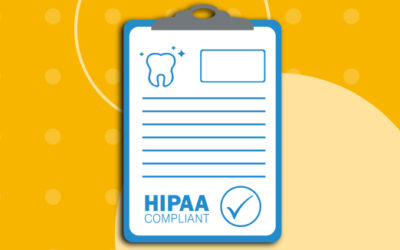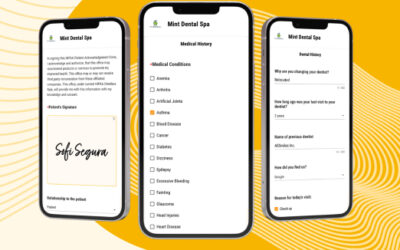
In the world of dental health, one of the most critical yet often overlooked aspects is the updating of patient medical histories. This practice is the backbone of comprehensive treatment planning and the key to unlocking optimal dental care in a modern dental office. But what does it mean to “refresh” patient medical histories, and when is it necessary to undertake such a comprehensive review?
While routine updates to patient medical histories are essential, there are specific instances when a comprehensive “refresh” of the patient’s medical history is required. A “refresh” means an in-depth reassessment and update of all aspects of a patient’s health, not just recent changes or new diagnoses. Here are the five key instances that should prompt such a comprehensive refresh.
Significant Change in Health
Suppose a patient has experienced a significant change in their health, such as a new chronic disease diagnosis, a significant surgical procedure, or a drastic change in their medication regimen. In that case, a complete refresh of their medical history is warranted. This comprehensive update enables dentists to create a new baseline for the patient’s health status, considering the impacts of these significant changes. It ensures the dental care aligns with the patient’s new health reality, safeguarding their well-being while optimizing treatment outcomes.
Changes in Health to Watch For:
- Diabetes Diagnosis: Increases the risk of gum disease. Regular dental care and updated medical history are vital.
- New Medication: Some drugs can lead to dry mouth, heighten tooth decay risk, or interact with dental anesthetics.
- Chemotherapy: Impacts oral health significantly and alters the patient’s response to dental treatments.
- Heart Disease Diagnosis: Certain dental procedures might pose a risk, necessitating special care.
- Osteoporosis Diagnosis: Influences the jawbone’s health, affecting treatments like dental implants.
- Autoimmune Disease Diagnosis: Conditions like Sjogren’s Syndrome can drastically impact oral health, necessitating adjusted dental care plans.
- Major Surgery: Especially head and neck surgeries can influence dental treatment plans.
Each of these situations signifies a significant change in health that would warrant a comprehensive refresh of a patient’s medical history and records.
Extended Gap in Dental Visits
Patients may, for a variety of reasons, experience extended gaps between dental visits. These gaps may lead to significant changes in a patient’s health going undocumented, whether due to life circumstances, relocation, or even a global pandemic. Upon returning to the practice, a comprehensive refresh of their medical history becomes essential. This ensures that their dental care considers any health changes that occurred during their absence.
A gap in visits are also a good time to consider adopting a dental appointment reminder system and potentially online scheduling.
Major Life Events
Major life events such as pregnancies, significant weight loss or gain, quitting smoking, or major lifestyle changes like retirement can significantly impact a person’s health status. These events may alter their risk profile for certain dental conditions or affect their response to dental treatments. Consequently, they should trigger a complete refresh of the medical history to provide the most personalized and effective dental care.
Example Major Life Events
- Pregnancy: Hormonal fluctuations can impact oral health.
- Significant Weight Loss/Gain: This could indicate dietary changes that impact oral health.
- Retirement: Changes in routine and potentially dental hygiene habits can affect oral health.
- Significant Dietary Changes: Shifting to a vegetarian, vegan, or high-protein diet can significantly alter oral health.
- Quitting or Starting Smoking: Smoking impacts oral health drastically. Quitting improves oral health while starting increases gum disease and oral cancer risks.
- Dental Emergency: If a patient has a dental emergency, it is reasonable to make no assumptions about what was impacted, and a thorough exam is recommended.
Introduction of New Dental Treatments or Technologies
The field of dentistry is continually evolving, with new treatments and technologies emerging regularly. These advances may require a broader or more detailed understanding of a patient’s health history. For instance, certain dental implants may interact with specific medications or new cosmetic dentistry procedures may carry risks for patients with particular health conditions. When such advancements are introduced into a dental practice, it’s an opportune time to refresh patient medical histories to ensure the safest and most effective use of these new options.
Milestone Age
Aging brings about numerous health changes, some of which may directly affect dental health. As patients reach milestone ages, such as 50, 65, or 80, it’s a good practice to refresh their medical history thoroughly. These comprehensive updates can capture the subtle health changes that come with aging, ensuring that dental care plans appropriately accommodate these changes.
Example Milestone Ages
- Turning 50: The onset of chronic diseases affecting oral health is common.
- Retirement at Age 65: Changes in daily routine, diet, and dental hygiene habits can influence oral health.
- Turning 80: Associated with complex health conditions and medications affecting oral health and dental care.
In conclusion, thoroughly refreshing patient medical histories is a cornerstone of personalized and effective dental care. It is not simply an administrative task of handing out a health history update form, but a proactive approach to understanding patients better, adjusting to their changing health needs, and optimizing their dental care. Dental practices prioritizing these comprehensive reviews demonstrate their commitment to delivering the highest level of care, cementing their reputation as reliable, patient-centered providers.
Dental practices can ensure they have the most current and accurate information by understanding when to refresh patient medical histories. This, in turn, empowers them to deliver optimal dental care, enhancing patient satisfaction and fostering a healthier community.


